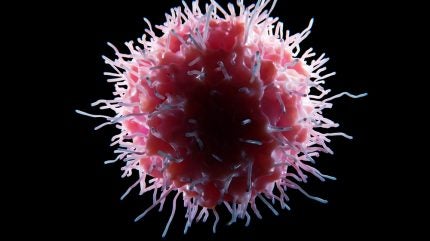Sanofi advances NK cell engager to Phase II for blood cancer treatment
Phase 2License out/inImmunotherapyAcquisition

Preview
Source: Pharmaceutical Technology
NKs are involved in the body’s first line of immune defence, which can recognise and destroy cancer cells. Image credit: Shutterstock/Juan Gaertner.
Sanofi has moved its natural killer (NK) cell engager candidate SAR443579/IPH6101 to a Phase II trial evaluating the drug’s use in treating a range of blood cancers.
The drugmaker dosed the first patient in the Phase II part of the Phase I/II trial (NCT05086315), according to a 15 April 2024, press release by research partner Innate Pharma.
The trial will investigate the therapy’s safety, pharmacokinetics, pharmacodynamics and anti-leukemic activity in various haematological malignancies.
The non-randomised trial is estimated to enrol 126 patients with diseases including relapsed or refractory acute myeloid leukaemia, B-cell acute lymphoblastic leukaemia and high risk-myelodysplasia, amongst others.
See Also:
BeyondSpring gets grant for treating cancer expressing mutant ras protein with plinabulin

Preview
Source: Pharmaceutical Technology
Corvus Pharmaceuticals gets grant for modulating interleukin-2-inducible T-cell kinase

Preview
Source: Pharmaceutical Technology
As part of the deal, Sanofi is responsible for the development, manufacturing and commercialisation duties of assets produced via the collaboration.
By progressing SAR443579/IPH6101 to the Phase II stage, Sanofi will pay Innate $4.26m (€4m) in a milestone payment.
Innate’s chief medical officer Dr. Sonia Quaratino said: “The progression of SAR443579 to the Phase II expansion part of the clinical trial in blood cancers is another step in bringing this innovative NK cell engager to patients.”
SAR443579/IPH6101 is an NKp46/CD16-based NK cell engager developed using Innate’s antibody-based NK cell Engager Therapeutics (ANKET) platform. NKs are involved in the body’s first line of immune defence, which can recognise and destroy cancer cells. Innate is developing therapies that activate NK cell receptors such as CD16 and NKp46. Other approaches include preventing NK inactivation by blocking inhibitory checkpoint receptors.
The other ANKET molecule licensed by Sanofi in 2016 was IPH-6401, currently in Phase II trials for relapsed/refractory multiple myeloma (RRMM) and relapsed/refractory Light-chain amyloidosis (RRLCA).
Innate and Sanofi expanded their partnership in 2022, allowing the latter company to license additional targets. As part of the expanded deal, Sanofi has licensed IPH62 and IPH67, with the option for one additional target. The deal included a $26.64m upfront payment and a potential $1.44bn in developmental, regulatory, and commercial milestones, as well as royalties on potential net sales.
Sanofi plans to spin out a new cancer therapy biotech this year when it agreed to acquire Inhibrx for $1.7bn. Whilst the drugmaker will directly take on one of Inhibrx’s drugs for a rare inherited disease, it will spin off the biotech’s anti-cancer drugs into a new entity. The company, dubbed New Inhibrx, will start its journey in the cancer therapeutic space with $200m in cash. The deal is expected to close in Q2 2024.
For more details,please visit the original website
The content of the article does not represent any opinions of Synapse and its affiliated companies. If there is any copyright infringement or error, please contact us, and we will deal with it within 24 hours.
Organizations
Indications
Hot reports
Get started for free today!
Accelerate Strategic R&D decision making with Synapse, PatSnap’s AI-powered Connected Innovation Intelligence Platform Built for Life Sciences Professionals.
Start your data trial now!
Synapse data is also accessible to external entities via APIs or data packages. Leverages most recent intelligence information, enabling fullest potential.





